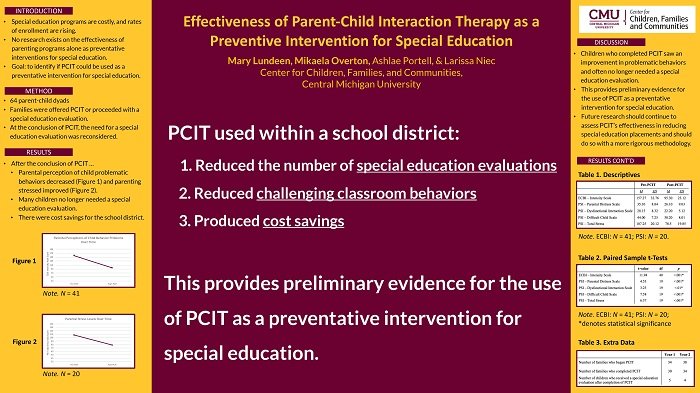Interaction Interventions
 Mikaela Overton, a graduate student in the clinical psychology department, investigated the use of Parent-Child Interaction Therapy (PCIT) as a preventative intervention for special education. This research was supervised by Dr. Larissa Niec and Mary Lundeen, a psychologist in Minnesota. Under the Individuals with Disabilities Education Act, the federal government provides funding to schools for special education services. However, there frequently isn’t enough funding provided to the states to cover the full extent of what each child may need, creating a burden on states and local communities. By providing a preventative intervention program, there is a chance for cost savings by reducing the number of special education evaluations and subsequent placements.
Mikaela Overton, a graduate student in the clinical psychology department, investigated the use of Parent-Child Interaction Therapy (PCIT) as a preventative intervention for special education. This research was supervised by Dr. Larissa Niec and Mary Lundeen, a psychologist in Minnesota. Under the Individuals with Disabilities Education Act, the federal government provides funding to schools for special education services. However, there frequently isn’t enough funding provided to the states to cover the full extent of what each child may need, creating a burden on states and local communities. By providing a preventative intervention program, there is a chance for cost savings by reducing the number of special education evaluations and subsequent placements.
PCIT is a two-phase behavioral parent training program that works with parents and their children to develop responsive caregiving within the context of age-appropriate limit-setting. Phase one of the program focuses on developing warm parent-child interactions by coaching a parent to follow their child’s lead in play. Phase two of the program focuses on providing instruction in a developmentally appropriate limit-setting procedure to assist parents in dealing with challenging child behaviors (e.g., non-compliance, aggression). PCIT differs from other parent-child interventions in that it involves practice with the parent-child pairs, while therapists coach the parents behind a one-way mirror in using the skills they have learned in live interactions with their child.
By implementing PCIT as a preventative intervention program, there is the possibility of improving child behavior and subsequently minimizing special education evaluations. It is known that special education placements can be expensive, costing school districts approximately $15,000 a year per child. Lundeen, a school psychologist in Minnesota, conducted the initial study within her school district. During the two-year prevention program, families whose children demonstrated deficits in social, emotional, or behavioral functioning were given the option to participate in PCIT or proceed with a special education evaluation. Within the first year, 30 parent-child pairs completed PCIT, with only 5 of these students still needing to be referred for a special education evaluation upon PCIT completion. In the second year, 34 pairs completed PCIT and only 4 were referred for a special education evaluation.
Overton and her colleagues hope to see PCIT implemented as a preventative intervention more frequently across the country. “One barrier, I think, is the number of providers trained in PCIT. We can always use more,” says Overton. Overton reports that her advisor, Dr. Larissa Niec, trains providers in PCIT internationally. “We know that this intervention works. We just need to continue disseminating it.” Overton shares that all the researchers would love to see this intervention brought to a larger scale as long as approval from school districts can be achieved and mental health professionals are available to provide the intervention.

At CMU We Do Research, We Do Real World
Story by ORGS intern Ellie Heron
May 2022